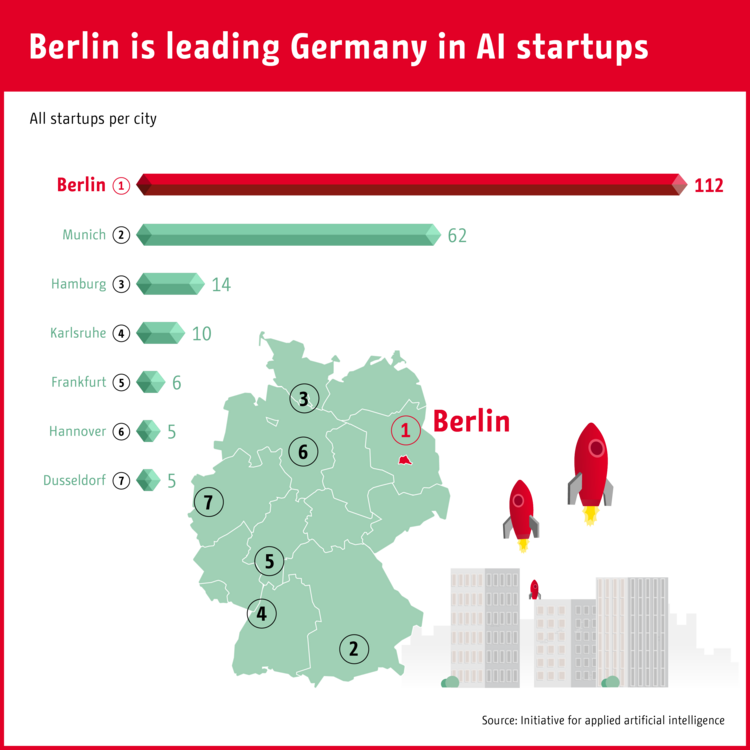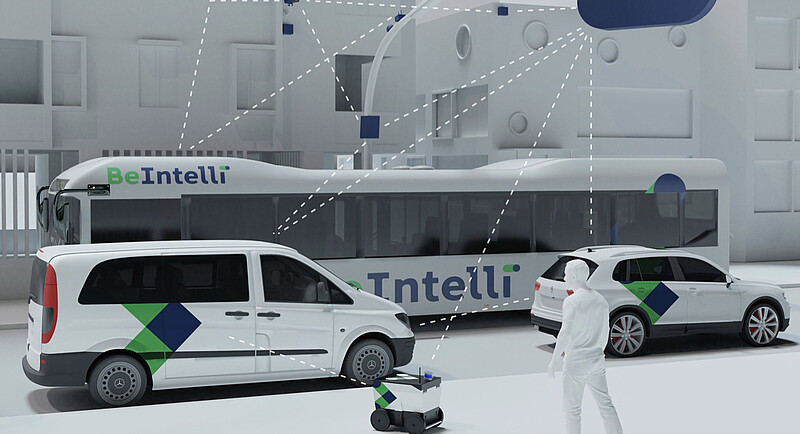How artificial intelligence is booming in Berlin
Artificial Intelligence is changing our lives as the steam machine or electricity did 250 years ago.
With a wave of new startups and cutting-edge research, Berlin is taking part in this revolution. With a total of more than 300 companies, Berlin is a European melting pot for innovators and visionaries in the field of AI.
What’s behind AI?
AI is a buzzword – often associated with sci-fi dystopian scenarios, like robots outsmarting mankind, flying cars, or a suave speaking computer operating system we fall in love with. But as we now know, we’re surrounded by AI every day. Helpful chat bots, parking assistants or face recognition, just to name a few examples, are making our lives more convenient.
At the core of artificial intelligence is a method of information processing called deep learning. This derivative of machine learning – which employs statistical methods to predict a certain outcome – uses multiple levels of understanding, respectively artificial neural networks inspired by the human brain, to independently draw conclusions. This also makes ‘big data’ one of the most valuable and sought-after resources of our time.
Berlin's AI edge
As early as the mid-2000s companies from the AI sector increasingly located their business in Berlin-Brandenburg. Examining the distribution of AI startups in the country, the initiative for applied artificial intelligence counted 112 (2021) of these tech innovators in the German capital. Large companies such as Amazon, SAP and Zalando have also set up major AI research labs in Berlin.
Curious about AI developments from Berlin? Read inspiring stories and interviews about the latest research projects and innovations on #ai_berlin.

The growing importance of Berlin as a centre of artificial intelligence is also closely related to its vibrant science environment with a large number of research groups at the four universities, the Fraunhofer Institutes, the German Center for Artificial Intelligence, the Zuse Institute, the Einstein Center Digital Future, several Max Planck Institutes, and institutes of the Helmholtz Association. An important hub for AI research is provided by the Berlin Institute for the Foundations of Learning and Data (BIFOLD), which evolved in 2019 from the merger of two national Artificial Intelligence Competence Centers: the Berlin Big Data Center (BBDC) and the Berlin Center for Machine Learning (BZML).
Since summer 2021, Berlin has a place where founders, investors, researchers, SMEs, and corporations from the AI scene are offered optimal conditions for intensive exchange and cooperation in the AI Campus Berlin.
Business intelligence
At 36 percent, innovations and services that analyze and improve internal processes account for the largest share of AI companies' activity. For example, knowledge-based expert and language systems automate business processes, making them more efficient and transparent. With the help of AI systems, market data is analysed and evaluated with a view to expected future developments. Other developments simplify personnel recruitment or help to implement marketing activities in a more targeted manner and to better address customers with data-protected analyses. Such as Lengoo with its “neural machine translation”, which provides translations on an almost human level. Or i2x's artificial intelligence solution that supports sales staff with the help of speech recognition technology.
Healthcare and Life sciences
AI systems from Berlin are used not only to support the internal processes of hospitals, but also for operation planning, diagnostics and data analysis of specific clinical images. Apps on fitness and health are being developed as well as chatbots which accompany patients during the health-related process: from diagnosis of the illness to the visit to the doctor and beyond.
A bright example of AI in healthcare is Berlin startup Ada, which obtained funding of more than 100 million euros for their sophisticated AI-powered diagnostics app. Launched globally in over 130 countries, Ada serves as a personal health consultant who evaluates the user’s health symptoms to provide suggestions about how to deal with them swiftly and efficiently. Another successful startup from Berlin is Audatic, which filters distracting background noises for hearing impaired or deaf people.
Read more on AI in digital health in Berlin here.
Mobility and city intelligence
A special focus of the Berlin AI companies is the development of driver assistance systems, such as German Auto Labs, a pioneer in automotive voice AI. Besides the core areas of autonomous driving, Berlin is also working on AI systems for road maps, apps for pedestrians, and augmented reality systems for air traffic.
The BeIntelli Project is exploring autonomous driving by using artificial intelligence on different levels, from utilizing raw data like weather and parking occupancy all the way to applying this to pooled data from individual sites, for instance adjusting traffic lights to different weather conditions such as slippery roads or altering routes to avoid traffic jams, noise pollution, and accidents.

Fittingly, there are companies developing hardware and software which enables machines to see intelligently. Berlin startup BrighterAI uses deep learning to anonymize visual data, such as people’s faces or license plates, while keeping the content natural and fully analyzable. The technology makes data collection in public compliant according to privacy regulations worldwide, such as GDPR in Europe, CSL in China and the CCPA in the US.
More information
The website #ai_berlin showcases current and pioneering developments, inspiring stories, companies, networks, initiatives, and experts in Berlin and Brandenburg for the national and international AI-community. The overall goal is to link tech companies, startups, research institutions, and talents on one platform and visualise and further strengthen Berlin as an AI-hub.
Header image: iStock





